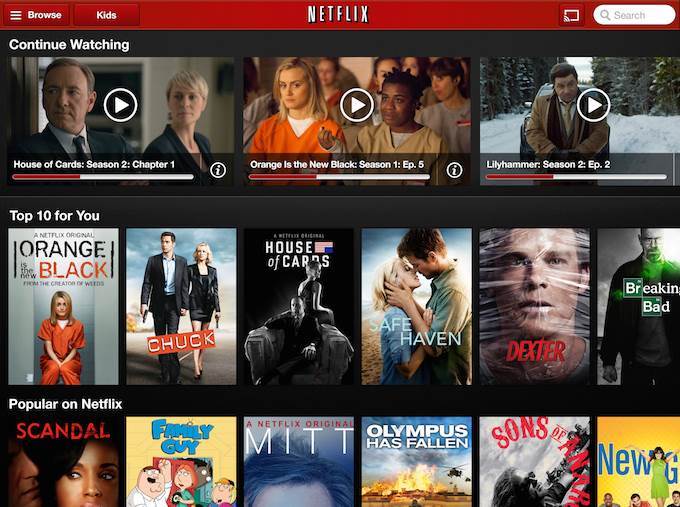Whenever a new technology arrives we typically misuse it. Rather than rethinking what’s possible and transforming industries, we consistently use it to embellish what we’ve done before.
We’ve seen this many times with new media. The first radio shows re-read newspaper headlines, the first TV shows were teleplays with cameras pointed at the readers, even websites today mostly replicate past forms with digital paper. Right now a tectonic shift from broadcast to streamed TV is upon us, and sometimes it feels like everyone is missing the point.
While everyone has talked about cord-cutting, surprisingly few have done it — largely because the packages on offer were substandard; the pricing didn’t work out; and content was limited. From Playstation Vue and Slingbox to the announcement of DirectTVNow (and shortly Hulu’s new TV service) we’re seeing a new tranche of offerings that should change how we view TV forever.
Yet a spin on these new services quickly reveals a gap in knowledge and how, so far, many companies have failed to understand how people’s behaviors and expectations have changed. This means a huge missed opportunity. The move from broadcast to streaming is of no interest, people don’t care how things get to them. They don’t care about the screen it’s on, they just care how they experience them.
More often than not we don’t go to content, it comes to us — suggested by friends or algorithms, in feeds or auto-playing next. In this context, two foundational elements of TV choice architecture are wildly irrelevant for the future but are still used as organizational principles for billion dollar decisions.
Beyond Channels to Search
Contemporary behavior is not to consume news directly from a publisher — virtually nobody goes to Buzzfeed.com and newspapers’ homepage traffic continues its precipitous decline (even most people reading this came to it from it somewhere else). How many of us found ourselves reading Teen Vogue somehow this week? Our relationship is no longer with a publisher, it’s with the article and aggregator. Similarly, in music we don’t browse what we love by their record label, we love bands or songs. We use apps that pull up all music and we navigate by genre, band or what’s suggested to us by an algorithm.
Latest Crunch Report
In every case, the old notion of a publisher curator has died. We think we don’t need physical newspaper editors whose role it is to gather a mixture of news and orchestrate a paper of varied content. We don’t need A&R people to decide what we like, bundle it into albums or event pay for it, content creation is now vastly more accessible, what succeeds is vastly more democratic, the barriers to entry somewhat lower, hence the abundance of stuff we have.
The same is true for TV, with a few notable exceptions we don’t watch channels we watch shows. We don’t rely on AMC to get us through the night, we watch Breaking Bad, wherever it may be. The role of TV channels is entirely irrelevant for curation, only relevant for the funding of shows we love. To take the entirely anachronistic device of the TV channel, and replicate it as an app, is stupid in the extreme. It was a solution to problems of a more primitive age.
Who wants to watch TV by selecting Apple TV, being paralyzed by 50 TV channel apps, then opening the CBS app, before selecting the show. It would be as silly as listening to Bastille by selecting the Virgin record label app from a screen of 50 other music apps.
Photo courtesy of Flickr/Victory of the People
Time for navigation is an anachronistic device.
The entire point of broadcast television was that a nation was beamed the same shows at the same time. All TV was live. People genuinely had water cooler conversations as a national culture was shaped by synchronous moments. Entire schedules were programmed this way. A station controller would assume Sunday night for nature documentaries, Friday night for raucous comedy.
For most of our memory “time shifting” TV meant a tape recording, or watching a DVD, It was the edge use case, our primary consumption was live. Netflix and “Video on demand” heralded a whole new era where content was freed from a moment in time. We’ve never quite understood how big this is and now this “time shifting” for connected households is the predominant form of TV
Yet the centerpoint of TV remains the electronic programming guide and it’s never changed. It shows irrelevant channels vertically and on a now irrelevant timescale.
Outside of news, sports or one-off events like the Oscars, it seems beyond imagination to a contemporary, savvy viewer today that time has anything to do with what they will watch. The idea that someone they’ve never met in a TV company would dare even suggest content for them is laughable.
Crunchbase
-
Apple
-
Founded
1976 -
Overview
Apple is a multinational corporation that designs, manufactures, and markets mobile communication and media devices, personal computers, portable digital music players, and sells a variety of related software, services, peripherals, networking solutions, and third-party digital content and applications.
Apple provides many products and services, including iPhone; iPad; iPod; Mac; Apple TV; a portfolio … -
Location
Cupertino, CA
-
Categories
Consumer Electronics, Retail, Hardware, Software, Electronics -
Website
http://www.apple.com - Full profile for Apple
-
Founded
-
Apple TV
-
iTunes
-
Description
iTunes is a digital media player app that can be used to play, download, and organize digital audio and more. -
Website
N/A - Full profile for iTunes
-
Description
-
Spotify
-
Founded
2006 -
Overview
Spotify is a commercial music streaming service that provides restricted digital content from a range of record labels and artists. Users can browse through the interface by artist, album, genre, playlist, record label, and direct searches.
It also enables individuals to create, share, and edit playlists with other users. If users want recommendations, they can integrate their system with Last.fm, … -
Location
Stockholm, 26
-
Categories
Cloud Computing, Video Streaming, Music -
Website
http://www.spotify.com - Full profile for Spotify
-
Founded
-
AMC
-
Founded
1984 -
Overview
AMC TV is a [Cablevision](/company/cablevision/)-owned television channel that primarily shows movies.
AMC is available in nearly 96 million U.S. households (Source: Nielsen Media Research) via cable and satellite services. If you live in the U.S. and subscribe to one of those services, you probably already have AMC. To find out definitely, and to determine what channel number has been assigned … -
Location
New York, NY
-
Categories
TV, Film -
Website
http://www.amctv.com - Full profile for AMC
-
Founded
-
Hulu
-
Founded
2007 -
Overview
Founded in March 2007, Hulu is operated independently by a dedicated management team with offices in Los Angeles, New York, Chicago, Seattle and Beijing. [NBC Universal](/company/nbcuniversal), News Corporation, [as of April 2009](http://www.techcrunch.com/2009/04/30/disney-buys-into-hulu-youtube-should-be-worried/), [Disney](/company/the-walt-disney-company), [Providence Equity Partners](/financial-organization/providence-equity-partners) … -
Location
Los Angeles, CA
-
Categories
Content, TV, Film, Video -
Founders
Elizabeth Comstock -
Website
http://www.hulu.com - Full profile for Hulu
-
Founded
-
Slingbox
-
DIRECTV
-
Founded
1990 -
Overview
DIRECTV (NASDAQ: DTV) is the world’s most popular video service delivering state-of-the-art technology, unmatched programming, the most comprehensive sports packages available and industry leading customer service to its more than 25 million customers in the U.S. and Latin America. In the U.S., DIRECTV offers its 18.56 million customers more than 130 HD channels and Dolby-Digital 5.1 theater-quality … -
Location
El Segundo, CA
-
Categories
Digital Entertainment, Sports,…
-
Founded







